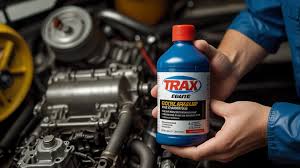
When it comes to maintaining and enhancing vehicle performance, car enthusiasts and everyday drivers alike often seek solutions that promise to rejuvenate aging engines and improve oil quality. Exploring the Compatibility of “Can I Used Engine Restorer and Triax Oil Additive Together”: What You Need to Know, Among the plethora of options available, two products frequently discussed are Engine Restorer and Triax oil additive. This leads to a common inquiry: “Can I used engine restorer and Triax oil additive together?” This article will explore the compatibility of these products, the benefits they offer, potential risks, and best practices for use.
Understanding Engine Restorer
What is Engine Restorer?
Engine Restorer is a specialized product designed to improve the condition of internal engine components. It typically contains a blend of unique chemicals and additives aimed at restoring engine compression, reducing wear, and improving overall engine performance. By addressing common issues associated with aging engines, such as decreased efficiency and increased oil consumption, Engine Restorer offers a viable solution for many vehicle owners.
Key Components of Engine Restorer
- Sealants: These components fill in small gaps and imperfections in engine components, helping to restore lost compression.
- Friction Reducers: These substances reduce metal-to-metal contact, minimizing wear and tear.
- Cleaning Agents: Some formulations include detergents that help clean deposits from engine parts, promoting better performance.
Benefits of Using Engine Restorer
- Compression Restoration: One of the main advantages is its ability to restore lost compression in engines, which can significantly improve performance.
- Reduced Oil Consumption: By sealing minor leaks and smoothing out surfaces, Engine Restorer can help reduce the amount of oil consumed by the engine.
- Enhanced Performance: Many users report improved throttle response and acceleration after using the product, contributing to a more enjoyable driving experience.
Understanding Triax Oil Additive
What is Triax Oil Additive?
Triax oil additive is formulated to enhance the performance of motor oils, providing additional protection to engine components and improving overall lubrication. These additives often contain a variety of ingredients that work together to reduce friction, prevent wear, and clean engine internals.
Key Components of Triax Oil Additive
- Detergents: These components help keep the engine clean by preventing sludge and deposits from forming.
- Dispersants: They help distribute contaminants throughout the oil, preventing them from settling and causing damage.
- Anti-Wear Agents: These substances create a protective film on metal surfaces, reducing wear during operation.
Benefits of Using Triax Oil Additive
- Enhanced Lubrication: Triax additives improve the oil’s ability to lubricate engine components, which reduces friction and extends engine life.
- Cleaning Properties: The detergents in Triax oil additive help keep the engine clean, promoting better performance and efficiency.
- Increased Longevity: By providing superior protection against wear, Triax oil additives can help extend the life of your engine, making them a worthwhile investment.
Can I Use Engine Restorer and Triax Oil Additive Together?
Analyzing Compatibility
When considering whether to use Engine Restorer and Triax oil additive together, it’s essential to evaluate their compatibility. Here are several factors to keep in mind:
- Chemical Composition: Both products are formulated with different active ingredients. Understanding their chemical compositions is crucial to determine whether they may react negatively when combined.
- Purpose and Function: Engine Restorer aims to restore engine performance, while Triax oil additive enhances oil properties. Their differing purposes may allow them to complement rather than conflict with each other.
- Manufacturer Recommendations: It’s always advisable to read the product labels and manufacturer guidelines. Some brands may explicitly state whether their product can be mixed with others.
Expert Opinions on Mixing Additives
Automotive experts generally recommend exercising caution when mixing additives. While some users have reported successful results when using both products together, others have experienced problems, such as reduced effectiveness or engine damage. Consulting with a mechanic or automotive professional before combining these products is a prudent step.
Testing Compatibility
If you are interested in using both Engine Restorer and Triax oil additive together, consider conducting a small-scale test. This could involve using each product separately in different oil changes to observe any changes in engine performance or condition. Monitoring the results can help determine whether they can coexist without issues.
Potential Risks of Combining Engine Restorer and Triax Oil Additive
- Chemical Reactions: Mixing incompatible chemicals can lead to unwanted reactions, which might reduce the effectiveness of one or both products and potentially harm engine components.
- Dilution of Benefits: Combining the two may dilute their individual benefits, resulting in suboptimal performance. For instance, if one product counteracts the effects of the other, the overall performance enhancement may be diminished.
- Warranty Concerns: Some manufacturers may void warranties if their products are used alongside other additives not specifically recommended by them. Always check the warranty details before using multiple additives.
Signs of Incompatibility
If you decide to use both Engine Restorer and Triax oil additive, be on the lookout for signs of incompatibility. Symptoms could include:
- Decreased engine performance or responsiveness
- Increased oil consumption
- Unusual engine noises or vibrations
- Changes in oil color or consistency
If any of these issues arise, it may be wise to discontinue use and consult a professional.
Best Practices for Using Engine Restorer and Triax Oil Additive
If you are keen on using both products, consider these best practices:
- Thoroughly Read Labels: Always read the product labels carefully for instructions, warnings, and compatibility information before use.
- Use Separately: To minimize risks, consider using one product at a time. For example, apply Engine Restorer first and allow it to work for a designated period before introducing Triax oil additive during your next oil change.
- Monitor Engine Performance: After using each product, keep track of your engine’s performance. Look for signs of improvement or any adverse effects that may arise.
- Consult Professionals: If you’re uncertain about using both products, consult a mechanic or automotive expert who can provide personalized advice based on your specific engine and circumstances.
Steps to Take if You Experience Issues
If you encounter any problems after using Engine Restorer and Triax oil additive together, here are steps to take:
- Stop Using Both Products: Immediately discontinue use of both additives to prevent further potential damage.
- Check Oil Levels and Condition: Inspect the oil level and its condition. If the oil appears discolored or has a strange consistency, consider changing it.
- Consult a Mechanic: Seek professional help to diagnose any potential issues that may have arisen from using the products together. A mechanic can provide insights into any damage and the best course of action.
- Document Your Findings: Keep a record of your observations and any changes in performance. This information may be helpful for troubleshooting and discussions with a mechanic.
Conclusion
In conclusion, the question “Can I used engine restorer and Triax oil additive together?” does not have a one-size-fits-all answer. While there are users who have successfully combined both products, others may face risks related to compatibility and effectiveness. It’s essential to consider the chemical compositions, manufacturer recommendations, and potential risks before proceeding.
Ultimately, maintaining your engine’s health requires a balanced and informed approach. Whether you choose to use one or both of these additives, thorough research, careful monitoring, and seeking expert advice when needed will help ensure that you achieve the best possible results for your vehicle. Prioritizing the longevity and performance of your engine through informed decisions about the products you use will contribute to a smoother and more efficient driving experience.







